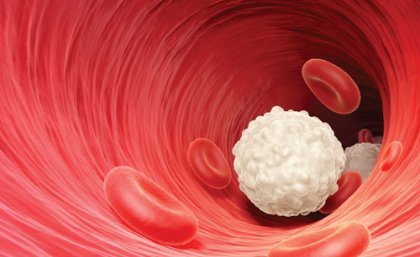
Deadly infections that can follow chemotherapy are the target of a landmark licensing deal between The University of Queensland and a United States-based biotech company.
Biotech GlycoMimetics Inc has developed an extensive library of compounds that mimic certain carbohydrates found on the outside of cells, known as ‘selectins’ and that have the potential to treat conditions including some blood and immune system disorders.
Mater Research Institute-UQ (MRI-UQ) researchers Associate Professor Ingrid Winkler and Associate Professor Jean-Pierre Levesque have developed an application for these compounds, known as an E-selectin antagonists to help prevent chemotherapy from depleting white blood cells necessary to protect the body from infection.
Associate Professor Winkler said E-selectin antagonists might benefit thousands of people, with more than 5000 cancer patients hospitalised in Australia a year because of the side-effects of chemotherapy.
“Chemotherapy is designed to kill rapidly dividing cells, such as cancerous tumours, however normal cells are also killed,” Associate Professor Winkler said.
“Other cell types – such as hair follicle cells, gut and white blood cell precursors – also divide rapidly and that is why chemotherapy can cause people to lose their hair, feel nauseous or succumb to infection during treatment.”
She said all white blood cells originate from haematopoietic stem cells and people were born with a finite number of these specialist white cell factories.
“Chemo targets these stem cells, and patients can be placed at high risk from infections that overwhelm the body and leave them with little chance of fighting back,” she said.
“The risk of these cells being killed increases significantly with each round of treatment, placing those who have repeated rounds of chemo at highest risk.”
The research team has shown E-selectin antagonists might help preserve the precious haematopoietic stem cells and minimise patients’ risks of becoming ill or dying from infection after chemotherapy.
UQ’s main commercialisation company, UniQuest, facilitated the deal between GlycoMimetics Inc and the research team at MRI-UQ, with an agreement officially signed this month.
The research has featured prominently in some of the world’s most prestigious journals, including Nature Medicine and Blood.
MRI-UQ is an alliance between Mater Research and The University of Queensland, two leading institutions working together to achieve the best possible research discoveries in health and medicine.
Media: Faculty of Medicine and Biomedical Sciences Media Manager Bernadette Condren, +61 7 3346 5309, b.condren@uq.edu.au
Mater Public Affairs Manager Jackie Hayes, 07 3163 2378, 0448 115874, Jacqueline.hayes@mater.org.au.
.jpg)

